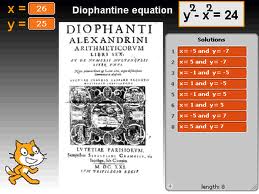 |
| Scratch.MIT.edu |
The usually quiet world of mathematics is abuzz with a claim that one of the most important problems in number theory has been solved.
Mathematician Shinichi Mochizuki of Kyoto University in Japan has released a 500-page proof of the abc conjecture, which proposes a relationship between whole numbers — a 'Diophantine' problem.
The abc conjecture, proposed independently by David Masser and Joseph Oesterle in 1985, might not be as familiar to the wider world as Fermat’s Last Theorem, but in some ways it is more significant. “The abc conjecture, if proved true, at one stroke solves many famous Diophantine problems, including Fermat's Last Theorem,” says Dorian Goldfeld, a mathematician at Columbia University in New York. “If Mochizuki’s proof is correct, it will be one of the most astounding achievements of mathematics of the twenty-first century.”
Like Fermat’s theorem, the abc conjecture refers to equations of the form a+b=c. It involves the concept of a square-free number: one that cannot be divided by the square of any number. Fifteen and 17 are square free-numbers, but 16 and 18 — being divisible by 42 and 32, respectively — are not.
Scientific American: Proof Claimed for Deep Connection between Prime Numbers
Comments